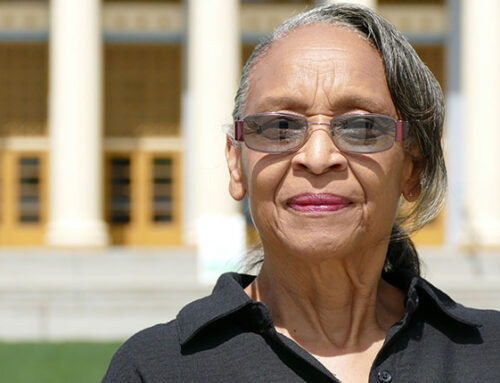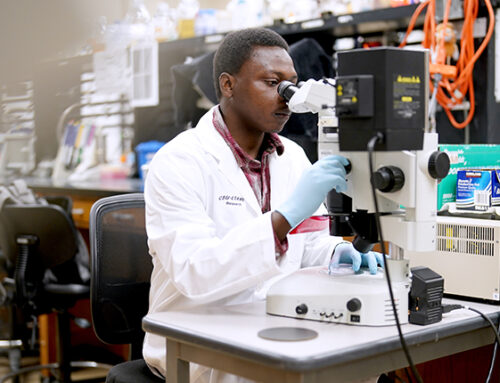A $200,000 gift by Land O’Lakes helped create the Fresno State dairy diagnostic lab to give students new opportunities to work with the latest technology to ensure herd health, nutrition and milk standards.
The lab, located in the graduate laboratory building near the campus dairy, is accessible to undergraduate and graduate students, including students in dairy classes and those working at the dairy unit to analyze milk quality and assess blood samples for cows with mastitis to determine the most effective antibiotic treatments.
“This lab provides a training ground for a key need in our industry,” said Pete Garbani, director of member and state government relations for Land O’Lakes and a 1991 Fresno State business administration and accounting graduate. “We’re seeing technology change rapidly and play an increasingly important role in how dairies operate. This equipment will give Fresno State students a variety of essential, lab-based skills, and also help meet the goal of our industry and co-operative to provide the highest quality dairy products to the community.”
Most of the funds gifted were used to buy specialized equipment to scan and analyze blood, feed and gas samples, as well as fluid composition and bacteria content. Other new equipment includes a centrifuge, incubators, microscopes and an oven.
In the past, students like dairy unit student manager and senior Logan Real did not have exposure or access to this equipment on campus, and instead sent out samples to outside companies.
The new equipment now saves time and money as she and the staff of nearly 20 students meet the round-the-clock needs of the campus herd of 315 Holstein and Jersey cows. A string of 135 cows is milked twice daily, and the new technology will better meet herd health needs while also encouraging higher milk production.
Under the direction of dairy faculty and program alumnus Dr. Kyle Thompson, research is also becoming a key link for students to work with industry and address specific issues.
This past year, graduate student Mikaela Fringer conducted studies on neonatal calf feed additives and the effects on milk yield and components.
Another recent graduate student, Bailey Britton, examined the effect of probiotics on small intestine health in dairy calves. She is now an employee for Calva milk formula products, which is owned by Land O’Lakes.
“We’re seeing undergraduate and graduate students come together in new ways because of access to this knowledge,” Thompson said. “We have a student accepted into veterinary school (Kyle Moucka) at UC Davis partly because he had used this technology with his honors cohort research project. The technology was essential for him to study how feed additives in neonatal dairy calves can affect blood counts and chemistry.”
Thompson envisions using the equipment to potentially research nutrition content and digestibility in relation to milk composition and quality.
Animal science classes that would use the lab include introductory and advanced dairy production and management courses, as well as a lactation physiology class.
“Knowledge is power,” said Justin Curti, a Land O’Lakes board member, Tulare family dairy owner and a 2004 Fresno State business administration and accounting graduate. “This experience can benefit students in many ways, whether they work at a dairy, other companies in the supply chain or organizations like the USDA or California Department of Food and Agriculture.”
Certain equipment could also be utilized by other Jordan College of Agricultural Sciences and Technology faculty who are testing research samples in the Food Science and Nutrition and Viticulture and Enology departments.
The campus dairy is the largest among the 22 units that comprise the 1,000-acre University Agricultural Laboratory.
Students working at the dairy unit gain key hands-on experience in one of the Central Valley’s most respected agricultural industries. California is the national leader in milk production, and nearby Tulare County is the nation’s highest-producing county.
Land O’Lakes is a member-owned cooperative with a legacy of more than 98 years of operation. Its largest facility, located in Tulare, processes milk from 160 dairy families in the Central Valley. Company operations span the spectrum from agricultural production to consumer foods in all 50 states and more than 60 countries. It ranked 212th on the Fortune 500 in annual sales in 2019 at $14 billion.



